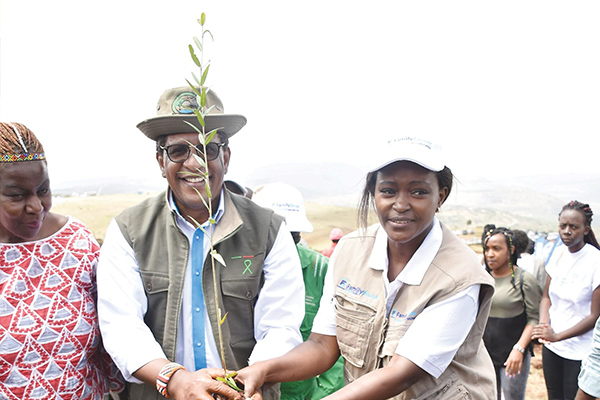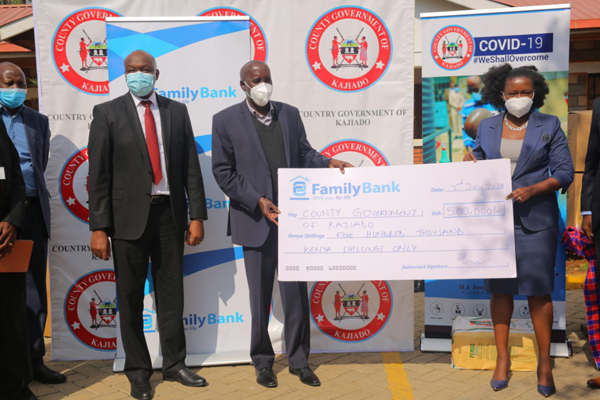#25
FAMILY BANK
Founded in 1985 with a single branch, Family Bank has transformed into a comprehensive commercial institution since achieving full-fledged status in May 2007. With an extensive network of 93 branches spanning 32 counties, the bank emphasises cultivating a robust retail customer base, particularly prioritising Micro, Small and Medium Enterprise (MSME) banking. Rooted in a vision to catalyse positive transformations in the lives of people across Africa, Family Bank boasts over 750,000 customers, 5,900 bank agents, and collaborates with over 8,000 merchants nationwide.
Family Bank emerges as a financial pioneer, demonstrating an unwavering commitment to impactful Environmental, Social, and Governance (ESG) practices. This dedication is seamlessly woven not only into its financial operations but also through its social investment arm, the Family Group Foundation.
Renowned for its digital innovation, the bank was the first to establish paperless banking through smart card technology, revolutionising transactions by eliminating the need for traditional deposit or withdrawal slips – a testament to its forward-thinking approach, as well as environmental consciousness.
To effectively manage funded emissions, Family Bank rigorously evaluates its borrowing customers against environmental and social standards. This proactive approach ensures that the bank avoids financing activities that harm the environment or communities. By integrating both financial and non-financial considerations into the credit process, the bank not only monitors its green book but also develops products that bring positive benefits to both the environment and communities.

Family Group Foundation Chairman Dr. Francis Muraya (R) & two of the 302 high school beneficiaries during the 2023
commissioning of the KES 60 million programme for bright but needy students.
Family Bank has established an Environmental and Social Unit within the Risk function, providing crucial advice on managing ESG risks and leveraging opportunities. This strategic move positions the bank as an entity that goes beyond financial returns, embracing a triple bottom line approach in its business operations.
As a member of the United Nations (UN) Global Compact, Family Bank, as the fourth commercial bank in Kenya to join the network, reports annually on its progress in key areas: Human Rights, Labour, Environment, and anti-corruption. The bank’s Strategic Plan for 2020-2024 aligns with the UN’s Sustainable Development Goals (SDGs) and the UNEP Finance Initiative Principles on Responsible Banking. This alignment demonstrates the bank’s commitment to creating value and ensuring a sustainable future.
In an effort to green its supply chain, Family Bank actively engages with suppliers, raising awareness of the environmental and community impact of their businesses. This involves providing training to vendors and revising tendering and bidding documents to incorporate ESG-related requirements.
Through the Family Group Foundation, in collaboration with entities like the Green Blue Foundation, Kenya Water Towers Agency, and Development Alternatives Incorporated (DAI), the bank continues its active contribution to environmental conservation for climate change adaptation, aligning seamlessly with the government’s greening initiative. The collective efforts have resulted in successfully planting over 15,000 seedlings within Kajiado County. In 2022, the bank significantly bolstered this commitment by adding 240 additional acres through a memorandum of understanding (MoU) with the Kenya Forest Service (KFS).
A notable contribution of KES 5 million was directed towards Ngong Hills Forest Ecosystem Restoration, forming a strategic partnership with the Ministry of Environment and Forestry, KFS, and Green Blue Africa Foundation (GBFA) under the ‘Adopt A Forest’ initiative. Additionally, the bank has reduced ecosystem disturbance by fencing degraded forest areas; implemented measures to control soil erosion; and rehabilitated water pans for sustainable water harvesting.

International Day of Forests and launch of the Ngong Hills Forests restoration project
Turning attention to the social aspect of ESG, Family Bank underscores the importance of prioritising its internal community before extending its efforts externally. Fostering a workplace culture that values diversity, fairness, and equal opportunities stands at the forefront. The bank ensures the success of its workforce through competitive compensation packages and a secure, talent-nurturing atmosphere. This commitment is especially pronounced in supporting the advancement of female employees, who thrive and progress within the bank. Further, Family Bank prioritises a safe, secure, and productive environment where everyone is treated with fairness and respect, exemplified by the implementation of an Occupational Safety and Health Management System. Skills enhancement takes centre stage through tailored internal and external training programs. The bank’s commitment to empowerment is evident in its engagement strategies, combining in-person interactions, staff events, workplace forums, and online platforms, ensuring that employees are integral contributors to Family Bank’s purpose and value creation for stakeholders.
Through the Family Group Foundation, the bank consistently champions social inclusion initiatives that contribute to community development as well as individual empowerment. The Foundation emphasises access to quality high school education, providing scholarships for bright and needy students. In 2022 alone, over KES 30 million benefited 227 students from 14 counties, fostering education from form one to form four. With a historical commitment, the Foundation has offered scholarships to over 1,000 students for both high school and tertiary education, prioritising holistic growth through mentorship and counselling services.
Beyond education, the Foundation actively promotes sustainable practices, including construction using green building technologies. Technical and vocational skills development in construction trades, such as plumbing, masonry, electrical work, welding, and carpentry, empowers youth for self-employment and wealth creation.
Furthermore, the Foundation recognises the crucial role of Information and Communications Technology (ICT) as a key enabler for economic growth. It provides capacity building, technical training, and skills development in animation, coding, and artificial intelligence (AI), generating technology-based solutions for social impact. The Foundation also supports ICT start-ups through business incubation, coaching, and investor readiness.
In the realm of agribusiness, Family Bank aligns its initiatives with the United Nations’ Sustainable Development Goals (UN SDGs), engaging in dairy, agri-business, water, livestock, horticulture, and renewable energy value chains. This collaborative effort with strategic partners aims to alleviate poverty and create opportunities for food security, focusing on climate-resilient farming technologies.
Additionally, Family Bank, in partnership with Water.org, actively addresses water, sanitation, and hygiene (WASH) challenges at the national and county levels, promoting access to finance for safe water and sanitation projects in alignment with UN SDG #6.

Bank Chairman Dr Wilfred Kiboro, Family Bank Board Member T.K. Muya during the signing of MoU where the Bank
donated KES 5M towards reafforestation of Ngong Forest.
The bank’s dedication to social impact is further evidenced by its scholarship program, strategically selecting beneficiaries through county panels and promoting economic empowerment through partnerships like the MoU with World Vision’s Tumikia Mtoto Project. This joint effort ensures young women are trained in construction, promoting self-reliance and empowerment. Post-training, the Foundation opens bank accounts for beneficiaries, encouraging financial inclusion and providing avenues for future financing.
Family Bank exemplifies a commitment to transparency, accountability, and ethical conduct. The bank has significantly enhanced its screening capabilities for customer onboarding and monitoring, ensuring a thorough due diligence process. Stringent policies and structures are in place, reflecting the bank’s dedication to good corporate governance and strict adherence to the rule of law. A comprehensive Code of Conduct and Ethics guides the principles and standards of professional conduct expected at the bank, fostering a culture of integrity and responsibility. This robust ethical culture permeates the institution, creating awareness of the negative impacts of non-compliance and instilling a sense of accountability and transparency.
In line with these principles, Family Bank actively engages in customer awareness initiatives, exemplified by its participation in the Kenya Bankers Association’s (KBA) ‘Kaa Chonjo’ campaign. This campaign focuses on educating customers about card, mobile, and online safety, ensuring a secure banking environment. The bank has also implemented a robust Anti-Money Laundering (AML) system, meticulously identifying, evaluating, and remedying AML risks. Regular communication and training sessions for employees on the AML framework further underscore the bank’s commitment to compliance and risk mitigation.

Moreover, Family Bank has instituted a whistleblowing portal, encouraging employees to speak up and report any concerns related to ethical practices or compliance. This proactive approach to internal reporting aligns with the bank’s dedication to maintaining a culture of openness and accountability.
Guided by the visionary and transformational leadership of the CEO, Family Bank epitomises ESG commitment, pioneering impactful practices. From green initiatives to social inclusion, it thrives in sustainability. Ethical governance underscores transparency and compliance, setting a responsible banking standard.
















